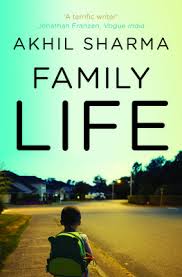Family Life
Akhil Sharma

Paperback: 240 pages Publisher:W. W. Norton & Company; Reprint edition (2014) Language: English« Book Excerpt »US: Half.com, AbeBooksUK: Amazon.co.uk, Abebooks.co.ukIN: Amazon.in, FlipkartPK: Fabingo, Liberty Bookstore |
For a short novel, Family Life has been a long time in the making. It’s nearly 14 years since Delhi-born author Akhil Sharma’s first novel, An Obedient Father, was published, going on to win the 2001 Hemingway Foundation/PEN award. It’s easy to say that writing this good, this subtle and precise, can’t be churned out in a hurry. But it’s also likely that the process wasn’t just painstaking but simply painful, with the harrowing story mirroring that of Sharma and his family, blurring the lines between memoir and novel.
Family Life is a story about a family moving from India for America for the promise of a better life, wealth and especially education. It’s told by Ajay, a narrator whose voice is always convincing, Sharma likely drawing heavily on his own experiences. The new life in America is wrecked when Birju, Ajay’s brother, suffers an accident that leaves him paralysed, unconscious, unable to move or speak, just after succeeding in the family’s dream of getting into the Bronx High School for Science. His mother, unable to admit to herself or to others the finality of his state, tells friends and neighbours Birju’s in a coma, that there’s a chance he’ll recover, when, in fact, it becomes obvious there’s no such hope. Its human responses like this, the pinpoint accuracies, that make the book so convincing. The tragedy takes its toll on the father most overtly, who starts to drink excessively. But the mother too is worn down, spending her days in the hospital watching her son, seeking out new ways not to give up hope, and eventually inviting ‘snake oil’ salesman into the family home to try to cure Birju. Ajay watches and observes but ultimately this is his story, about how the pressures of trying to live well enough enough for two sons, not one, weighs on him. The novel’s also an immigrant’s account, ringing true with details of the shame Ajay feels about his race: “I preferred talking to the Jews over the Chinese or the Indians. The Jews were white, and so they seemed more valuable than the others.” Ajay talks of racism and shouted abuse from passing whites, while walking with his mother. “I wanted to carry stones in my pockets” to throw at the racists, he says. The Indian community also don’t come out of the book well, irrational and superstitious on the one hand (“It is common among Indians to look at someone who is suffering and sacrificing and think that that person is noble and holy.”), but judgemental and disloyal at other times, especially when Ajay’s father’s drinking is revealed. There’s also a comment here on healthcare, the family’s tragedy compounded by years of struggling to afford treatment. Compensation payments are split with lawyers, insurance companies avoid paying out for medical help, and the stress and economic hardship and hours of filling out forms add to the isolation felt by the family. “I want to hang myself every day,” Ajay’s father says in one of only a few blunt exchanges. The rest comes in subtle details, like Ajay noticing the carpet in his parents’ bedroom has been cleaned overnight, due to his drunk father being sick. Sharma avoids anything showy or histrionic; small details accumulate instead. At just over 200 pages, Family Life isn’t a long novel. But it’s difficult to imagine any added words or pages would have given it more of a satisfying emotional punch than it has. It’s a book where you read the last few pages slowly, carefully, because you don’t want it to finish Reviews
|
